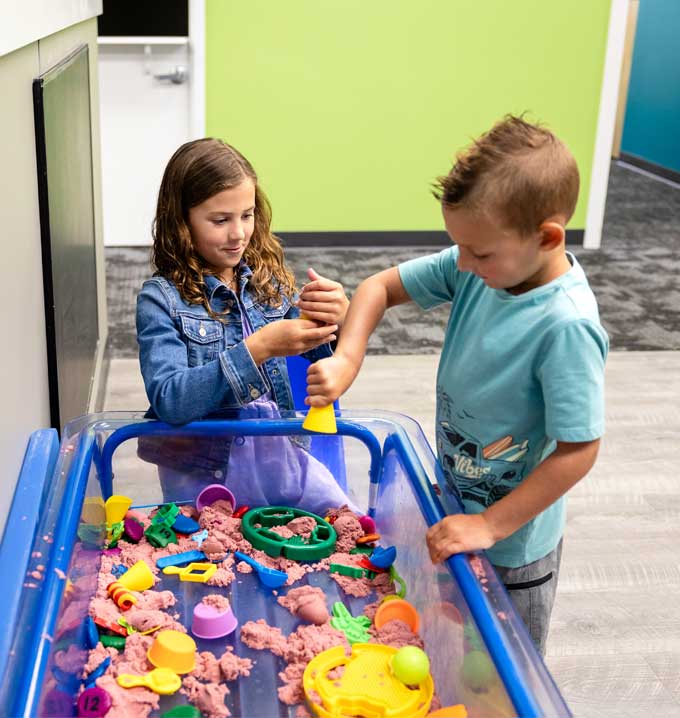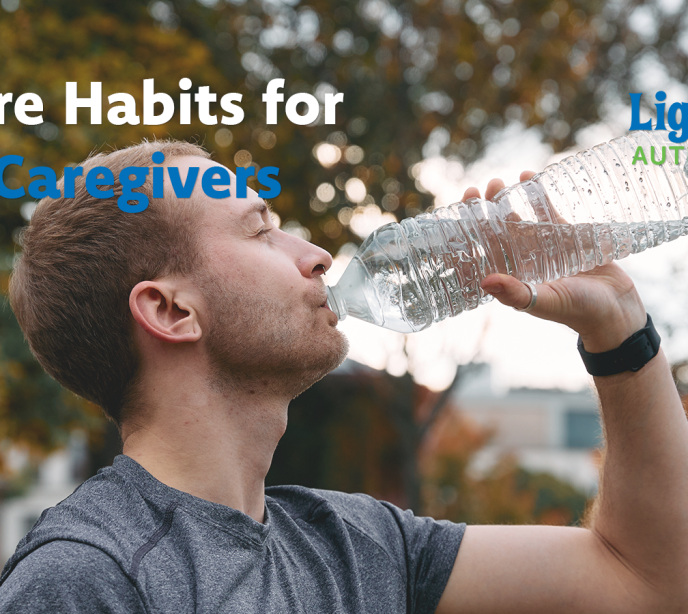Safe Activities for Autistic Children – Lighthouse Autism Center
Safety is a prominent concern for any parent or caregiver of every child regardless of being on the autism spectrum. There are wide variety of activities that can help children with autism learn life skills, work on socialization, and so much more, all while having fun! Children with autism enjoy a variety of activities based on their abilities, skills, and needs.

Safe Activities for Autistic Children
Activities for Autistic Children
Safety is a prominent concern for every parent or caregiver, regardless of whether they are caring for an autistic or allistic child. A wide variety of activities can help autistic children learn life skills, work on socialization, and so much more, all while having fun. Autistic children enjoy a range of activities based on their abilities, skills, and needs.
Pretend Play
Pretend play opens the doors for your child to use their imagination while they play, turning their usual time playing with blocks, dolls, puppets, or trains into an exciting activity that also acts as a great learning tool. Children can create stories that match their interests, expand their imaginations, and help them learn skills to deal with real life.
Pretend play also allows your child to explore their creativity and create rich stories by pretending to sail a couch boat, feed a teddy bear, or dress up as their favorite fictional character. Exploring scenarios that mirror real-life experiences, like visiting a grocery store, dentist, or veterinarian, can also help autistic children develop social skills and learn motor and life skills. Pretend play can be one of the most enjoyable and beneficial social skills games for autism because, through these activities, autistic children can learn to understand different perspectives, interpret social cues, and express their creativity.
All Lighthouse Autism Centers have play-based therapy rooms that immerse children in imaginary and naturalistic play spaces. These spaces offer more motivated learning opportunities and help autistic children become more comfortable in diverse social situations. They create gentle opportunities for autistic children to practice communication, improve their language skills, learn to tolerate overstimulating situations, and build confidence through play.
Pretend Restaurant
Building on the above point, a fun group skills game for autistic kids is playing restaurant together. Many kids love to do this as it becomes fun, imaginative play. Use play food or hand-drawn food, a notepad, and a pen, and create play money to enhance the experience. Kids will love eating at the restaurant or even running their own restaurant and taking orders. This simple activity creates a fun, interactive environment that allows children to explore different roles, practice communication, and engage in storytelling through a familiar and enjoyable activity. By designing menus, serving “customers,” and managing their restaurant, autistic children can develop important social skills in a fun, safe, and supportive way.
Object Sorting
Sorting is an important occupational and language building activity for autistic children. Collect various items such as play foods or toy blocks and have your child sort them into categories. Kids can also sort snacks by size, color, and similarities. Work on adding and subtracting with the snacks, and if you’re using smaller items, you can add an extra challenge by asking your child to sort the items using a pair of tweezers or their less dominant hand. This helps kids with motor skills, colors, shapes, basic math, counting, and more.
Imitation and Mirroring
Autistic children often struggle to make eye contact. A fun way to encourage them to do so is to ask them to imitate you and/or others. Imitation is also one of the primary ways children learn, so teaching these skills are helpful to support future learning and learning from peers. Use a mirror or a game like Patty Cake to help your child develop social and language skills. Games like Simon Says or Follow the Leader can also encourage imitation and mirroring skills for autistic children. These games can help improve social and motor skills.
Music
Music offers a powerful, multisensory experience for autistic children. The rhythm, repetition, and sounds of music can calm autistic children and teach them important language, communication, and rhythm skills. Share songs that rhyme, include physical actions, or incorporate daily activities like dressing or eating food. Let kids explore sound by shaking maracas, banging pans together, and playing other instruments as they make music. This can be a fun activity for autistic kids that allows them to create and experience music in their own unique way.
Singing
Encourage your autistic child to sing. This is important for a child’s development, as well as their expression and creativity. Learn new songs together as a family. Play some of your favorite songs from when you were growing up.
Dancing
Lighthouse Autism Center often celebrates Fun Fridays with a dance party. It’s important for autistic children to be creative in their movements. Dancing is very fun and expressive and supports motor skills and socialization, and get out some energy!
Online Sensory Games
Online sensory games can be a valuable resource for autistic children, offering a safe and engaging way to develop various skills while having fun. Autism-friendly online games provide sensory stimulation through visually and audibly appealing content, helping children improve their cognitive abilities, motor skills, and social interactions. By creating a controlled and structured environment, online sensory games can reduce anxiety and increase comfort, making them an excellent, safe activity for autistic children.
Board Games
Board games provide invaluable opportunities for autistic children to develop social skills, practice turn-taking, and improve their problem-solving abilities. These structured activities offer a predictable, comfortable environment where children can learn cooperation, manage emotions, and engage with others through interactive play. When choosing board games for autistic kids, opt for games that align with your child’s interests and sensory needs. This can help you create enjoyable learning experiences for your autistic child that support cognitive and social development.
Outdoor Activities and Playgrounds
Playground visits help autistic children stay active and engage their emotions and senses, as well as offer several social opporunities. Visit a park and allow children to slide, swing, and run as they play alone or with peers. Lighthouse Autism Center offers private playgrounds at all our centers for active outdoor play.
Swimming
According to the Autism Spectrum Disorder Foundation (ASDF), swimming provides invaluable therapy for autistic children, as well as providing opportunities for improved speech, coordination, social skills, self-esteem, and cognitive processing. Enrolling your autistic child in swimming lessons can be highly beneficial. Many autistic children are drawn to water for its calming sensory experience. However, water can also present a major safety concern. Drowning is the leading cause of accidental death for children and adults on the autism spectrum. According to the National Autism Association, accidental drowning accounted for approximately 90% of total U.S. reported deaths in autistic children under the age of 14. Furthermore, introducing your child to water safely and seeking swim lessons has proven highly beneficial for autistic children.
Water Table
A water table offers a fantastic sensory play experience for autistic children, helping them develop critical neural pathways through tactile, visual, and proprioceptive exploration. Use a water table, a small inflatable or plastic pool, a bucket, or a bathtub. Drop items into the water to have your child scoop out with a kitchen spoon or tongs. Add toys, pompoms, balls, and anything else to engage your child in this fun sensory exploration.
Swinging
Swinging is a very therapeutic activity for autistic children. There are so many ways to use a swing for therapy. All Lighthouse Autism Centers include a swing in our play spaces. They are versatile because they can be used for calming and self-regulation or just a fun, enjoyable activity. Many parents of autistic children purchase sensory swings for at-home use.
Water Balloon Toss
This is a simple and fun way to play catch while getting wet and staying cool in the heat. Toss balloons into buckets and knock over objects you have set up. Smaller balloons are harder to pop, so the smaller you make some balloons for games, the longer the play can continue.
Bubble Blowing
Blowing and catching bubbles is a favorite activity at Lighthouse Autism Center. This activity helps children with sensory and joint attention difficulties.
Drawing and Coloring
Drawing helps autistic children develop fine motor skills, work through emotions, and experiment with colors, textures, and shapes. Provide crayons, paints, and pencils, and let them color a picture or create their own design on a blank canvas.
Story time
Storytime is another favorite at our centers. Books are a great resource to work on various skills. Ask kids questions as you read. For example, if you were reading “Cinderella,” you could ask things like “can you find Cinderella? Or what color is her dress?” This helps autistic children learn empathy and helps them with perspective-taking.
Together, we can unlock your child’s potential
Related News

01/15/2026
10 Simple Self-Care Habits for Autism Caregivers
Caring for a child with autism is rewarding, but can also be demanding in ways that aren’t always visible. Between daily routines, therapy schedules, advocacy, and emotional labor, many caregivers find themselves running on empty, even as they continue to show up for their child every day. Earlier this year, we explored this reality in our blog post, The Power of Pause: Why Caregiver Self-Care […]

01/05/2026
The Power of Pause: Why Caregiver Self-Care Matters
As a new year begins, many families naturally reflect on what they hope the months ahead will bring—more peace, more balance, more support. At Lighthouse Autism Center, we’ll be taking a deeper look at the importance of self-care throughout the month of January, offering resources and encouragement to help caregivers start the year feeling supported and grounded. But […]

11/18/2025
Tips for Picky Eaters and Introducing New Foods
Autistic children are often labeled as picky eaters, but the truth is that they face a unique set of challenges that can make mealtimes extremely stressful. Discover helpful tips on introducing new foods into your child’s diet to make mealtimes more nutritional and enjoyable for everyone at the table. Autism and Food: Tips for Introducing […]


